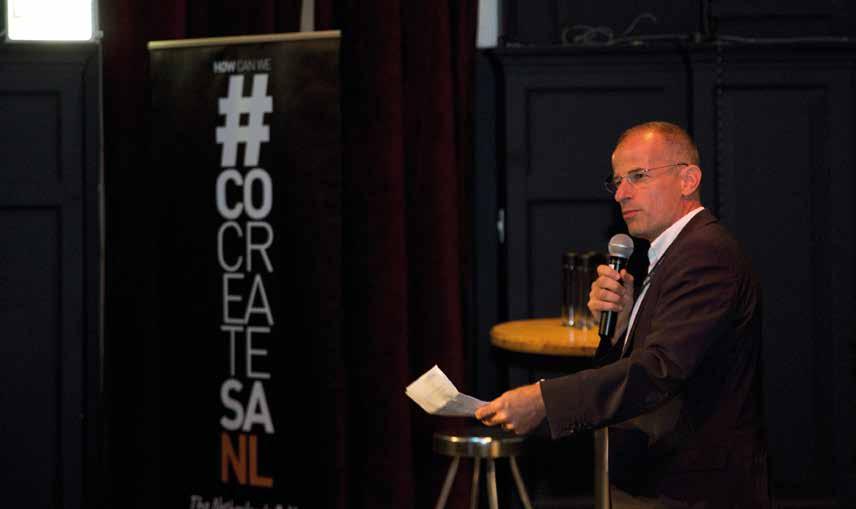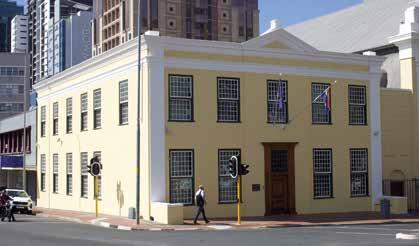
7 minute read
Consul General
Sebastiaan Messerschmidt
THE DUTCH REPRESENTATIVE IN CAPE TOWN
Advertisement
Sebastiaan Messerschmidt became Dutch Consul General in Cape Town in August 2018. He is a great believer in the power of co-creation and thinks South Africa poses quite a few challenges.
Speaking of challenges, Messerschmidt has experienced some trying times already. He was in Cape Town when the water supply was in danger because of severe drought. And in April 2020, at the start of the COVID-19 pandemic, he suddenly found himself in charge of the repatriation of thousands of stranded Dutch citizens and other foreigners. “All of a sudden I was a travel guide, I had to organise coaches to transport the people to the airport. It was a bizarre situation.”
I assume South Africa has surprised you many times?
“Like many Dutch I was, and still am, surprised by the special historic link between the Netherlands and South Africa. We share an
“I FIND IT VERY INTERESTING TO REPRESENT THE NETHERLANDS IN THE CAPE. THIS PLACE IMMEDIATELY PUTS ITS SPELL ON YOU AND IT IS EASY TO LOSE YOUR HEART TO IT”
extraordinary history that goes back to 1652. For me personally it is important to emphasise that we were very active at the time in supporting the Anti-Apartheid Movement, both socially and politically. We wholeheartedly took up the cause.”
But…
“Yes, there is a but. In April 1652 Jan van Riebeeck landed in South Africa to set up a refreshment outpost for the Dutch East India Company, the VOC (Vereenigde Oost-Indische Compagnie), and that resulted in tens of thousands of enslaved people being brought to the Cape. Nowadays people here in South Africa still identify with this period in time. As a representative of the Dutch authorities I am

sometimes called to account about being a representative of that history. For instance, I was walking my dog in Green Point Park and got talking to a man. He said: ‘I am here because of you.’ I asked him what he meant, and he replied: ‘I am Cape Malay. That means that your ancestors shackled my ancestors, put them on a ship and brought them here. That is why I am here because of you.’ His life is still determined to some extent by the fact that he is here because of the VOC. Of course the identity issue has been intensified because South Africa used to be an Apartheid state and discrimination was regulated by law and implemented by the state. People here link the consequences of that with the VOC and Jan van Riebeeck.”
What does this mean for Dutch people wanting to work and live in the Western Cape?
“It means that we play a role in the recognition of the position we held in that history which still reverberates today. In the words of a film maker I spoke to, who described it beautifully: ‘You need to shut up and listen, and don’t come to me with your white guilt.’ That has become my mantra. We Dutch shouldn’t want to be part of the debate, but we do need to be there to listen to the inconvenient story, without starting to defend ourselves, without formulating an answer. The embassy and the consulate have set up a cultural programme in an effort to create a space for this discussion in South Africa about South Africa and what it means to be a Dutch person there, these two aspects.”
So, no ‘yes, buts’. What about an apology?
“No, saying sorry is no use to anyone. A ‘premature apology’, as I like to call it, would put an end to the discussion. My aim is to have this discussion together. For instance, we fund the digitisation of the VOC records in the Western Cape. In that way people can bring back their own history. For example, someone called Februari can look in the archives and see that the surname was given to people who were enslaved in February. People really want to find out more about their identity, and it is important that they feel they are allowed to know where they belong, that they have a place to call home. Another example: on our website cocreatesa.nl you will find interviews with South Africans from various backgrounds, about religion, economic background, and about who they really are in this country.”
“IT IS RUGGED, IT IS BEAUTIFUL, IT IS RICH, AND IT IS POOR. IT IS NOT EASY, BUT IT IS ALSO FANTASTIC IF YOU MANAGE TO MAKE A SUCCESS OF IT”
You think it is important the Dutch people in the Cape understand in which society they find themselves.
“Economic ties are the mainstay of our relationships, but we also try to show companies what the do’s and don’ts are in their personal contacts. That you have to take the time to really get to know each other. Just as you would do in most countries outside Europe, you first build a relationship. And this relationship goes deeper than the odd Zoom call and a signature. South Africa is a tremendously interesting country, but it is also a traumatised society. People here carry a lot of life baggage and posses a lot of wisdom. We can really learn from them.”
Does that make Cape Town a special posting for you?
“I find it very interesting to represent the Netherlands in the Cape. This place immediately puts its spell on you and it is easy to lose your heart to it. In my view the nature of the people also to some extent reflects the landscape. There are mountains that simply hurl themselves into the sea. It is rugged, it is beautiful, it is rich, and it is poor. It is not easy, but it is also fantastic if you manage to make a success of it. Tremendous beauty can be found in the drama, and doing business here can be easy one day and completely impossible the next. People setting up a business here really have an entrepreneurial heart. They have staying power and are going for the long haul. They know what it is like to be on the receiving end, to pick themselves up and get going again. That is why I have so much respect for entrepreneurs like the Aaldering family. They manage to run an excellent company and make a success of it. They produce delicious wines. I love drinking them.”
Are you a wine lover?
“I don’t drink very much, but when I do, I always go for a superior wine. I particularly like the South African Shiraz grape. But also the white South African wines, the Chenin, Sauvignon Blanc and Chardonnay are high quality. They are certainly a match for the French wines, for instance. I can wholeheartedly recommend a visit to the Cape Winelands therefore, to meet wine farmers like Aaldering Vineyards & Wines. They make splendid wines and what could be better than tasting them while looking out over the vineyards and enjoying the atmosphere. Absolute bliss!”
“ACTUALLY, YOU ONLY NEED ONE WORD TO SUMMARISE THE BEAUTY OF THIS COUNTRY: PHENOMENAL!” You have been in the country for three years now. What would you recommend to tourists wanting to travel to South Africa?
“South Africa badly needs tourists and has incredibly much to offer, like Kruger National Park, the Cape Winelands, and Table Mountain. The diversity is very attractive. But I would certainly recommend tourists to look a bit further than the beautiful beaches and surfing hotspots. Visiting the Slave Lodge in Cape Town, for instance, is very worthwhile, or the splendid Zeitz Museum of Contemporary African Art. Unlike what you would find in Europe, most city centres here are not particularly attractive in my opinion. Nature is what South Africa is really all about. Tropical jungle, the arid Karoo, mountain ranges like the Swartberg Pass, and sleepy villages like Prince Albert. I am a cyclist myself and my ultimate trip is the one across Chapman’s Peak. Actually, you only need one word to summarise the beauty of this country: phenomenal!”


* In The South African Dream issue 2016 we interviewed Bonnie Horbach, Sebastiaan Messerschmidt’s predecessor. She highlighted the work of a consul general and the importance of co-creation. Read the interview on










